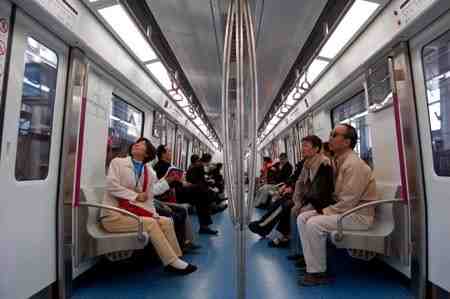Subway to go citywide by 2015
Updated: 2007-12-14 07:05
People within Beijing's Fourth Ring Road will never be more than about 1 km from a subway station once a new citywide mass-transit rail network is completed in 2015, an official said Thursday.
|
|
Speaking at a press conference, Liu Xiaoming, deputy director of Beijing's municipal committee of communications, said that by that time, 8 million people will use the subway every day, up from the current 2.9 million.
He said that by 2015, about 45 percent of all journeys made in the capital, including those by bus, will be on public transport, up from 34.5 percent at present.
Ten new subway lines are currently under construction, most of which will not be completed until after the 2008 Olympics.
Two, however - Line 10 (which includes the branch going through main Olympic venues) and the airport rail line - will be opened ahead of the Games, Liu said.
By next year, the total length of the city's subways will be 200 km.
To meet demand during the Games, the committee plans to extend the operating hours of all subways and buses, and add 34 special Olympic bus routes, Liu said.
With some 1,000 new cars appearing on Beijing's roads every day, Liu said authorities in the capital are under increasing pressure to address the traffic situation.
"But we will not curb private car ownership. What we will do is continue to adopt policies that encourage people to use public transport," Liu said.
This year, the price of a standard bus ticket was reduced to 0.4 yuan (5 cents) for public traffic card holders and a subway ticket to 2 yuan, making Beijing one of the cheapest places in the country for public transport, he said.
Chen Chen, a journalist in the capital, said: "People from outside Beijing are often surprised when they find it costs only 0.4 yuan to ride on a bus here."
In many other cities, the standard fare is at least 1 yuan, he said.
The price cuts will cost the municipal government 4.15 billion yuan this year, Liu said.
He said the government has earmarked 71.5 billion yuan for public transport between 2006 and 2010, which accounts for 45 percent of the total investment on communications infrastructure.
"The investments and efforts have stopped Beijing's traffic situation from deteriorating, and in some areas have actually seen improvement," Liu said.
Wang Gang, director of the Beijing municipal center for communications, said at yesterday's press conference that car owners will also be encouraged to fit satellite navigation systems.
"Our research has shown they can cut traveling time by up to 15 percent," he said.
|
|
|
||
|
||
|
|
|
|
